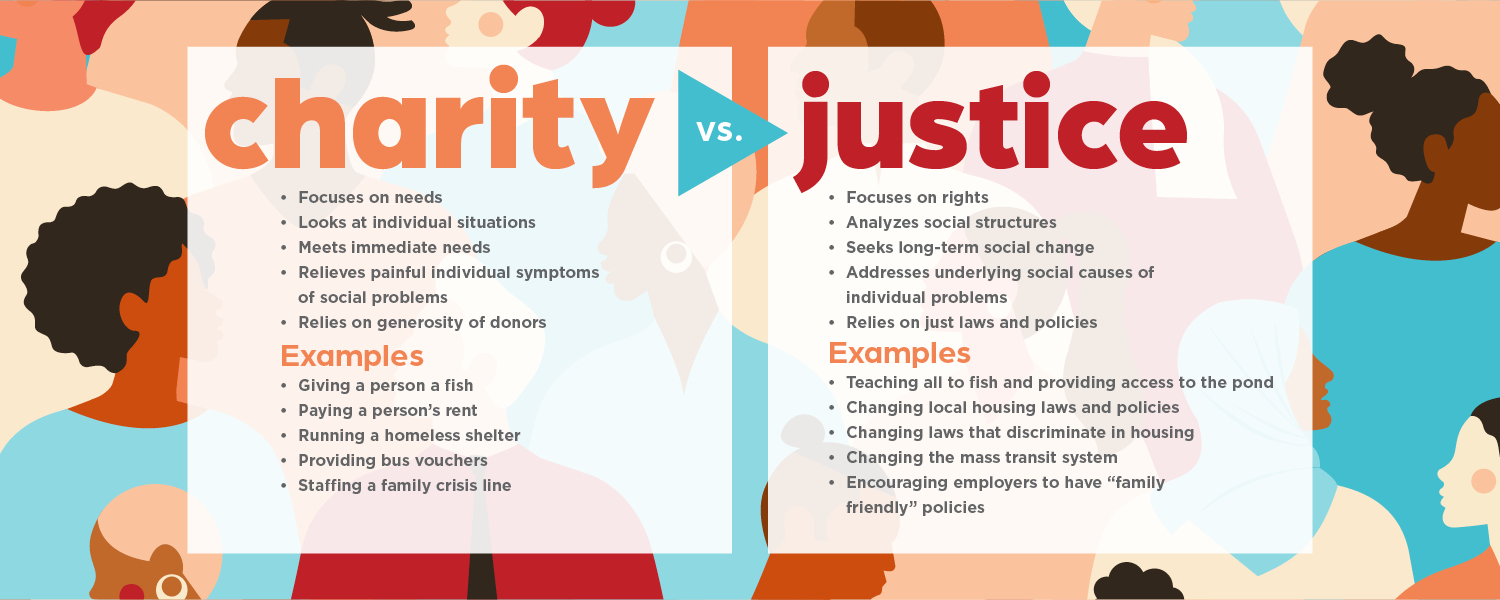FREQUENTLY ASKED QUESTIONS

Does CCHD fund non-Catholic initiatives?
Projects may include partnerships with other faith-based and secular groups— collaborations the Church sees as a unifying, effective means of working together for the common good. No CCHD-funded group can be at odds with Church teaching, including those that are members of coalitions with agendas, positions, and actions that contradict Church teaching. Catholic and Catholic-affliated organizations will receive priority.
What does the moral and social teaching of the Church include?
CCHD asks organizations requesting funding to adhere to these basic principles central to the Catholic mission:
- Respect the dignity of the human person
- Prioritize the poor and vulnerable
- Develop initiatives that pay a living wage
- Fight poverty through institutional change
- Uphold fundamental human rights such as food, clothing, housing, employment, and health care
- Support the right to participate in society and its organization
- Promote peace, solidarity, and a commitment to the common good
For more detailed information, visit CCHD Basic Principles of Catholic Mission.
How does CCHD verify its grantees are not against Catholic values?
- Applicants must sign a document affirming compliance with the Church’s teaching and nonpartisan political engagement.
- Staff and CCHD committee members review all applicants and conduct on-site visits.
- All projects require final approval from the St. Louis archbishop.
- Grantee social meida and websites are monitored throughout the year.
CCHD welcomes concerns about its review processes and grantees. Any allegation of improper activity will immediately be reviewed, investigated, and acted upon. Read CCHD Review and Renewal to learn the U.S. bishops’ response to concerns about some CCHD funding policies.
Is CCHD involved in politics?
The teachings of the Catholic Church and the regulations of the U.S. Internal Revenue Service prohibit CCHD, a 501(c)(3) organization, from engaging in or supporting partisan political activities, including participating in a campaign supporting or opposing any candidate for elective public office. As such, organizations involved in partisan political activities are ineligible for CCHD funding.
The Church does call its members to support civic participation in democracy. One way CCHD does this is by supporting non-partisan voter registration efforts undertaken by applicant groups.
For more information on the Church’s teaching on political life, read “Forming Consciences for Faithful Citizenship — A Call to Political Responsibility from the Catholic Bishops of the United States.”
Why does the Catholic Church support community organizing?
CCHD considers community organizing to be one of many tools to give greater voice to the poor and to help Catholics exercise their moral responsibility to participate in public life. Used well, it can be an effective way to do the following:
- Change the conditions and policies which leave people poor • Become more informed voters
- Participate in advocacy on behalf of the vulnerable
- Join with others in public witness of the Catholic faith
- Put Catholic social teaching principles into action
- Bring together people of varied socio-economic, ethnic, and religious backgrounds to work together in solidarity for the common good
Should I apply for a local or national grant?
Locally-funded Projects
- Smaller in scope or at the early stage of development
- Awarded up to $10,000
- Reviewed by local CCHD committee
- Final approval by St. Louis archbishop
Nationally-funded Projects
- Well-established, yet need funding to grow and become self-sufficient
- Awarded $25,000-$75,000
- Reviewed by local CCHD committee and national CCHD staff
- Final approval by St. Louis archbishop and U.S. bishops overseeing CCHD
For more information on local funding, visit Grant Funding Process. For more information on national CCHD grants, visit here.
How does CCHD define “institutional change?”
Catholic social teaching understands the causes of poverty to be an aspect of “social sin” rooted in our social and economic structures and institutions such as government, corporations, and private agencies. CCHD works to change an institution’s policies and operational structures that create and perpetuate poverty, or impose injustice on low-income people.
Examples of institutional change
- Modify existing laws and/or policies
- Change the behavior of individuals and institutions to benefit the low-income individuals and communities
- Redistribute decision-making powers so that low-income people are involved in policy-making that affects their lives
What’s the difference between social justice and charity?
The Church describes social justice and charitable works as two different but complementary ways we act in response to God’s love. CCHD was established as a social justice complement to other charitable poverty programs. Compendium of the Catechism of the Catholic Church (2005), no. 411

